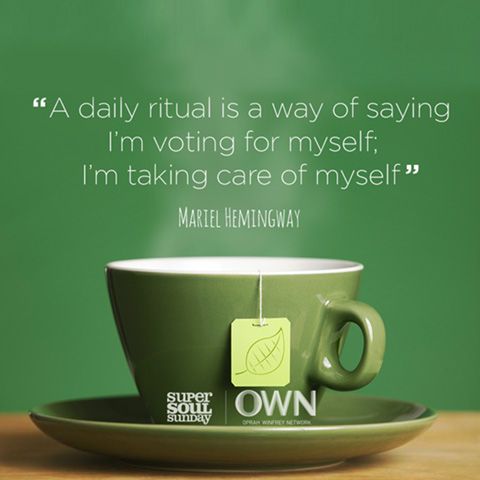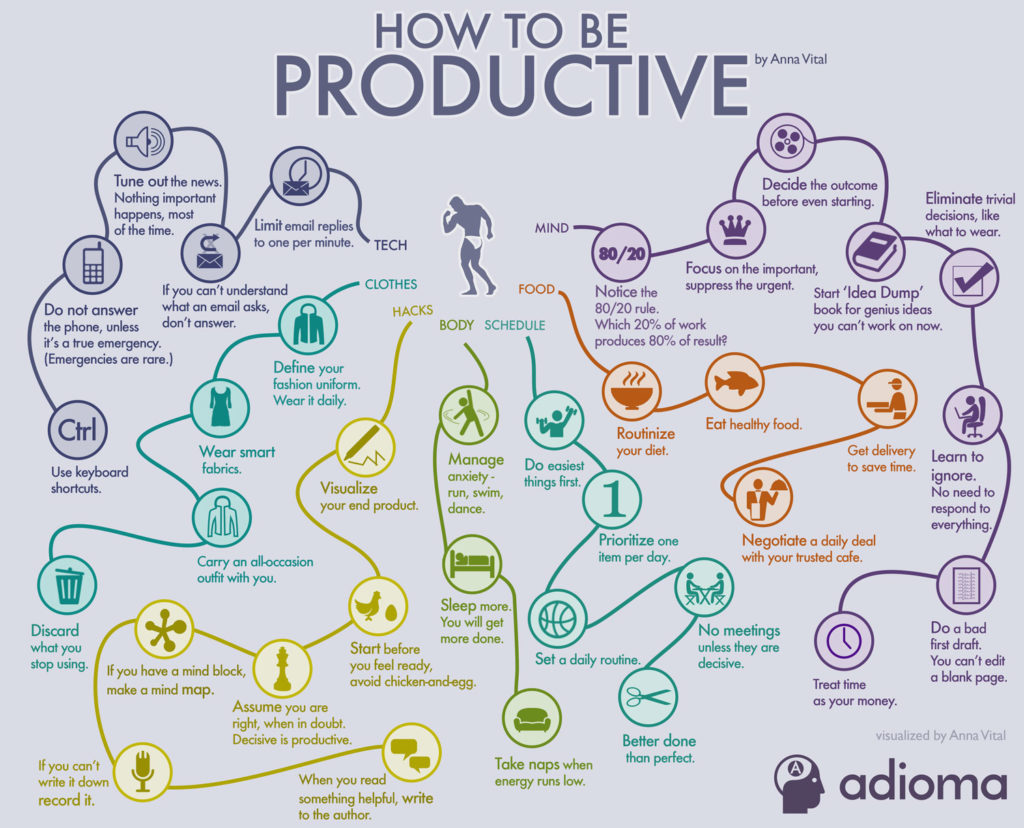
A key characteristic of successful people is that they are highly productive – they tend to get more quality work done in a shorter span of time. While talent plays an important role in their success, their real power comes from creating a lifestyle that’s conducive to growth. Find out the daily rituals of highly productive people and how you can use it to boost your efforts toward success and personal growth. (Estimated reading time: 6-7 minutes)
“Ordinary people think merely of spending time, great people think of using it.”
— Arthur Schopenhauer
One of the critical characteristics of successful people is that they are highly productive – they tend to get more quality work done in a shorter span of time when compared to the average person.
While talent undoubtedly plays a role, the real secret to their prowess is their ability to create a lifestyle that’s conducive to success. They finesse the right conditions that enable them to be productive and efficient in their endeavors.
Cal Newport, author of “Deep Work,” states that if we want to master complicated information and produce better results in less time, we have to engage in the titular deep work – the ability to focus without distraction on a cognitively and creatively demanding task.
The ability to dive into deep work is a superpower in our increasingly competitive economy. In a society that thrives on instant gratification, where people naturally seek quick and easy routes to fortune, the person who is willing to roll up their sleeves and do the work gains an instant advantage.
Deep work sounds simple in theory, but it’s far from it. Replacing distraction and our penchant for simplicity and speed with complex and tedious tasks goes against our instincts.

If you’ve ever thought to yourself, “this is so much work…it’s just too hard!” – know that it’s a natural reaction. Your brain, just like everyone else’s, is averse to anything that feels like “work.”
What I have found in my experience as a life coach and through my own personal observations is that most people start out with good intentions. They want to accomplish their objectives and carry out their plans with full gusto, but pretty soon, they lose steam.
This usually happens when they reach a point where the cracks in their plan begin to appear, or they lose enthusiasm because of the perceived monotony of the work involved. This thought-loop of wishing things were easier and faster is the biggest roadblock to making progress.
Just like our time and resources, it’s important to understand that the amount of willpower you have is finite and depletes over time. For this reason, we must be frugal when it comes to where we direct our passion-inspired efforts and how we spend our valuable willpower.
Newport states, “the key to developing a deep work habit is to move beyond good intentions and add routines and rituals to your working life designed to minimize the amount of your limited willpower necessary to transition into and maintain a state of unbroken concentration.”

Our rituals essentially ground our vision. A ritual is a practice or pattern of behavior that’s performed regularly. Highly productive people use them as building blocks in making their dreams a reality.
This process isn’t easy, and their commitment is tested frequently, but they stick with it long enough to see results. What we perceive as genius is nothing more than a person who stays committed to their rituals and carries them out with efficiency.
Why do rituals work? They ensure that our basic needs are met and that we feel nourished as we carry out plans. Rituals also tap into the power of the subconscious. When you follow a strategically planned routine with the right rituals, you become habituated, meaning you can carry out routine tasks on autopilot.
Things will seem easier than they did before. However, getting to the point of habituation requires momentum, like an airplane needs acceleration to gain the momentum to lift off the runway before reaching a cruising altitude.
There are a ton of life hack articles on productivity that you can read, but I believe that we learn best from those who have successfully applied self-created rituals, developed through trial and error. Success leaves clues, and we can turn to history’s most successful people for ideas.

I read several books and studied the routine and schedules of some of the most talented people in history, like Steve Jobs and Maya Angelou. I looked for common rituals they followed.
Behind the scenes, true masters follow a steady work schedule and feel comfortable with mundane daily rituals to fulfill their goals. The good news is that anyone can reach their heights of greatness and emulate their secrets for mastery and personal growth.
Here are the top five daily rituals of some of the most highly productive people:
1. They take care of their physical bodies: Your body is your vehicle for life – neglecting or abusing it significantly lowers your capacity to function at peak levels. That’s why productive people create non-negotiable rituals to manage their physiology – a regular exercise regime, eating healthy, nourishing meals, and getting sufficient sleep. Besides the obvious health benefits, exercise boosts energy, relieves stress, and increases positivity.
Eating the right foods results in mental alertness, a regulated blood sugar level, and high energy levels. Media Mogul, Arianna Huffington, advocates sleeping eight hours a day and keeping all electronics out of the bedroom. She claims that a well-rested mind is an essential component of a productive mindset.
2. They make time for learning and feeding their minds: As vital as it is to decide what you should eat, it is just as important to be selective about what you feed your mind. When our mental diet consists of junk like celebrity gossip, incessant social media feeds, reality TV shows, and inflammatory news, we end up with cluttered minds. Productive people minimize their exposure to this clutter. They treat their minds as a sacred space and fill it with useful things that stimulate their thought processes and fuel their creativity.
Self-made billionaires like Warren Buffet, Mark Zuckerberg, and Bill Gates devote many hours a day reading for learning and educational purposes. Even if you don’t read, you can learn through other ways like watching documentaries, YouTube videos, or listening to podcasts and audiobooks.
3. They structure and organize their days: Unlike those who complain about not having enough time during the day to complete things, productive people master the art of making time, no matter how busy they are. They know that life doesn’t bend to their schedule and that there will be inconveniences and less than ideal circumstances they’ll have to deal with.
When Mozart couldn’t find a wealthy patron to fund his dreams, he spent his days giving piano lessons, attending concerts and wooing wealthy patrons. When he arrived home each night, he would stay up till the early hours composing music. In addition to prioritizing, using tools like to-do lists, sticky notes, calendars, and daily planners adds structure to their day, allowing them to keep track of the activities that need to be completed.
4. They make time for rest and reflection: Quiet rituals like meditation, breathwork, journaling, long showers/baths, visualization, contemplative walks, prayer, yoga, and writing offers a chance to relax and take a break from a continuously active mind. Research has shown that carving out time for mindfulness and reflective practices boosts productivity because it clears the mind of worries, repetitive thoughts, stressors, and mind chatte.
Motivational guru, Tony Robbins, refers to his daily meditation practice as “priming” – a ritual that involves directed and conscious breathing and movement that keeps him centered and focused on his goals.
5. They give priority to what brings them joy: Whether it’s a creative hobby or spending quality time with family and friends, productive people make sure that they carve out time for things that bring them a sense of joy and. Neglecting our hearts dims our light and makes us less capable of staying resilient and positive in the face of obstacles.
Entrepreneur Mark Cuban, for example, makes non-negotiable time during his weekend to spend with his family. Other joy-enhancing activities include a practice of gratitude, laughter, giving back and supporting others, and making time for fun and play.
Our aim should go beyond leading a productive life to living our lives wholeheartedly. Living wholeheartedly, a term coined by author Brené Brown, is about engaging with our lives from a place of worthiness. It’s about accepting that our efforts are often less than perfect and that we may falter despite putting our best foot forward.
We can wake up in the morning thinking, “no matter what gets done and how much is left undone, I am enough… it doesn’t change the truth that I am brave and worthy of love and belonging.”
All my best on your journey,
Seline

Question for you: Do you have any daily rituals that work for you? How do they impact your productivity and wellbeing?
Did you like this post? Sign up below, and I’ll send you more awesome posts like this every week

Dear Seline,
Thanks a lot for this post of yours! I liked it and would be happy to get more posts from you.